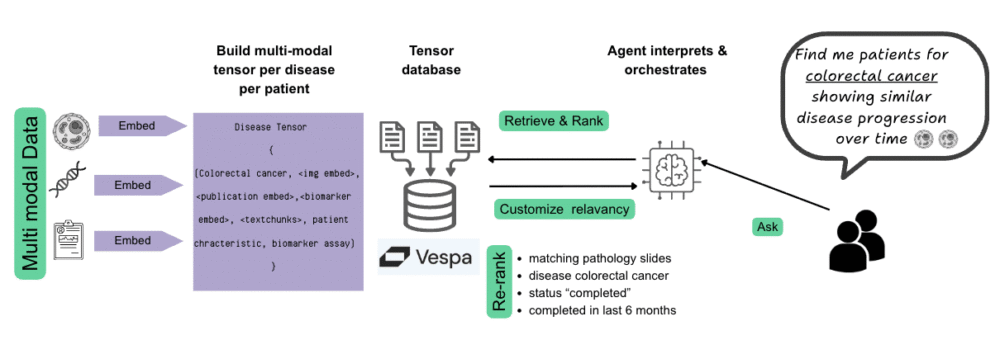Beyond Vectors: Why Life Sciences Need Tensors
From protein folding to patient-trial matching, Vespa.ai enables faster, more precise AI by reasoning over tensors, not just vectors, across life sciences data.
Precision at Production Scale for Scientific Data
Life sciences teams work across multimodal, highly regulated data, including proteins, images, trial registries, scientific literature, and clinical transcripts. The challenge is not simply generating text or wiring up a chatbot. It is building systems that can find, assemble, and rank the most relevant information with both speed and precision. In drug discovery, diagnostics, and clinical development, that difference directly impacts outcomes.
What Makes Tensors Different
Tensors extend beyond vectors by representing data in multiple dimensions at once. This allows AI systems to model connections that are critical in biology and healthcare but invisible in a flat array.
In structural biology, tensors encode spatial relationships between amino acids. This enables models such as AlphaFold to predict how proteins fold, which is vital for identifying new drug targets. In clinical trial matching, tensors can represent not only trial text but also metadata like trial phase, indication, and site location—ensuring that patient-to-trial recommendations are both semantically relevant and clinically appropriate. In medical imaging, tensors capture pixels and their surrounding context, improving the sensitivity of cancer detection by highlighting anomalies that might otherwise be overlooked.
Each of these examples illustrates why tensors, not just vectors, are indispensable for life sciences AI. They capture the multi-dimensional patterns inherent in biological and clinical data and make it possible to reason over them in real time.
Why Vespa is Relevant
Vespa is an AI Search Platform designed for accurate retrieval at scale. Unlike standalone vector databases, it integrates lexical search, structured queries, and semantic similarity natively. This makes it possible to run hybrid queries such as: “Find clinical trials for a biomarker X in phase 3, started in the last two years, within 500 miles of Boston.”
Because Vespa supports tensors directly, it can store embeddings of proteins, compounds, and images alongside regulatory metadata, patient cohorts, or molecular properties. Real-time indexing and multi-phase ranking ensure that results reflect the most up-to-date data and are ordered by what matters most: relevance, recency, and domain-specific rules.

From Complex Data to Discovery: Native Tensor Search in Vespa for Life Sciences
Implications for Life Sciences
For a pharma R&D team, Vespa accelerates compound discovery by retrieving molecules not just by structural similarity but also by functional annotations and literature co-occurrence. For a biotech company running clinical trials, it enables evidence engines that surface trials tailored to specific patient profiles, incorporating both molecular markers and trial metadata. For health tech providers, it supports multimodal retrieval across medical imaging, transcripts, and wearables data. This enables faster, more precise diagnostics and patient insights.
These applications share a common requirement: precision and scalability. Whether it is matching patients, predicting protein interactions, or interpreting images, tensors combined with Vespa’s hybrid retrieval make it possible to move from research demos to production-grade systems.
Proven at Scale
Vespa has already proven its ability to serve billions of queries in production for leaders like Yahoo, Spotify, and Perplexity. Yahoo relies on Vespa to power personalization and content selection across its properties. Spotify uses Vespa to deliver semantic podcast search. Perplexity leverages Vespa for real-time retrieval over a billion-document index.
The same scale and precision that support these web platforms can be applied to health and life sciences, where the stakes are higher but the technical challenges are strikingly similar.
Looking Forward
As the field advances toward agentic AI and multi-step reasoning, the ability to retrieve and rank information with accuracy and context becomes even more critical. In life sciences, each query, whether about a protein fold, a trial design, or an imaging anomaly, must be both fast and correct. Vespa’s tensor-native approach ensures that systems are not only capable of handling today’s multimodal workloads but also ready for the next generation of AI applications.

Ready to Unlock the Power of Tensors?
Generative AI in life sciences demands more than vectors. Vespa.ai is the tensor-native search platform, combining vector, keyword, and structured retrieval with real-time ranking and inference to deliver the precision and scale required for scientific AI applications.